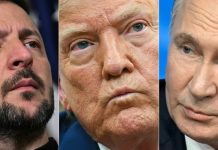The US is increasingly facing the heat from Russia and China for allegedly fomenting trouble in Cuba. In the midst of the crisis, a prominent Cuban-origin American has called for a Pakistan-style operation in the country.
US Speeds Up Development Of ‘Defense Shield’ That Can Thwart Hypersonic Threats From Russia & China
Cubans have taken to the streets, protesting against shortages of food and medicines, electricity outages, and an unprecedented economic crisis in the country. And countries such as China and Russia were quick to point fingers at the US.
On July 11, the island nation was rocked by the biggest protests since the fall of the Soviet Union in 1991 as thousands marched the streets in the capital city Havana.
As the demonstrations spread to other regions, some protestors renewed the demand for a regime change in the one-party state, ruled until recently by the Castro brothers (the late Fidel Castro and his brother Raul Castro) since the communist revolution took place in 1959.
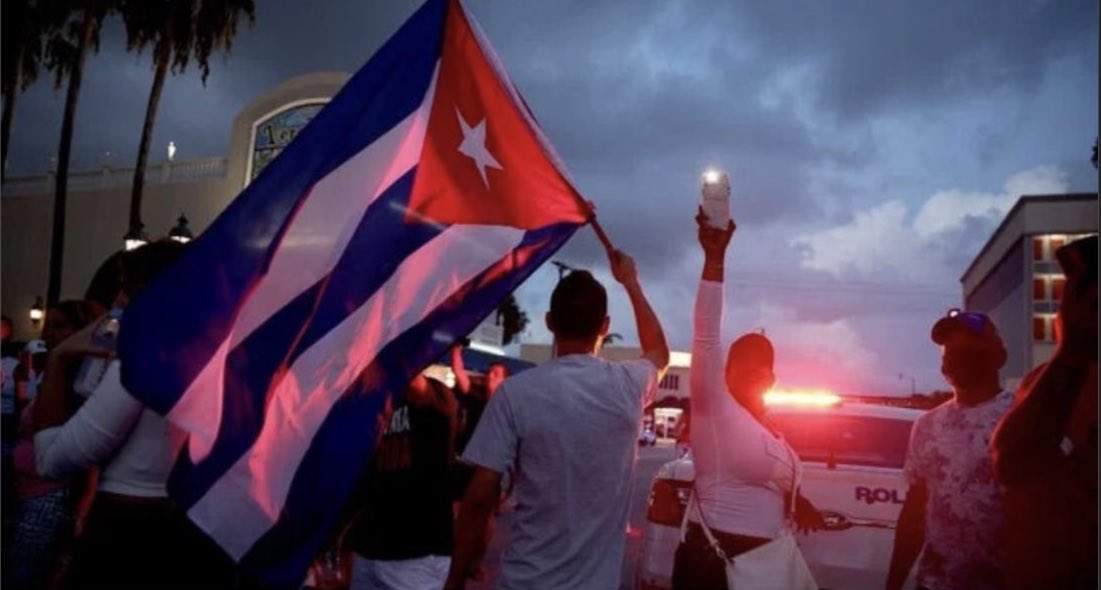
Chanting “freedom” and “end of dictatorship”, the protestors received bipartisan support from Cuban-Americans, besides US President Joe Biden who called Cuba “a failed state” and criticized the alleged high-handedness of authorities in suppressing dissent.
Global human rights organization Amnesty International reported “internet blackouts, arbitrary arrests, excessive use of force – including police firing on demonstrators”, while hundreds of protestors, activists, and journalists have been arrested.
While accepting government shortcomings in handling shortages, the Cuban authorities blamed social media and the United States for interference and threatened a “battle in the streets”.
In a four-hour-long televised speech, Cuban President Miguel Díaz-Canel slammed the dissidents, calling them “counter-revolutionaries” and “mercenaries” paid by the United States and allied with anti-Castro Cuban exiles.
Why Is Cuba Blaming The US?
At the center of the controversy around the US’s role in “orchestrated and predetermined” protests is a social media campaign called “SOS Cuba”.
The Cuban authorities allege that the campaign has received funding from the US State Department. The campaign is particularly active in the state of Florida, which is home to a dominant Cuban-American population.
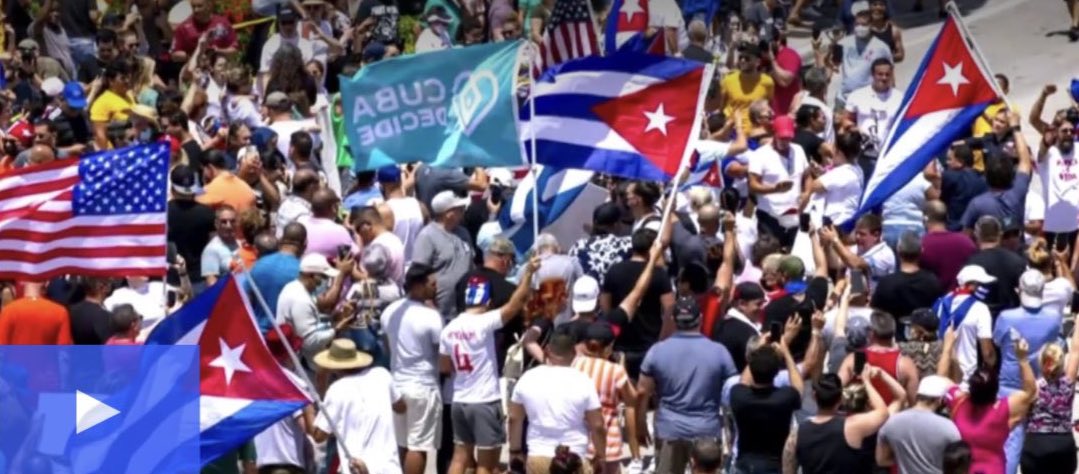
Members of the Cuban Democratic Directorate, a Miami-based organization that advocates for democracy in Cuba, are asking for an intervention by the international community led by the United States, “to protect the Cuban people from a bloodbath and to bring this regime to an end”.
Recently, Miami Mayor Francis Suarez called for “airstrikes against Cuba” while pointing out past military interventions that included the killing of Osama Bin Laden with a US air operation in Pakistan.
Suarez said that Washington must consider airstrikes against Cuba, telling Fox News that “what should be contemplated right now is a coalition of potential military action in Cuba” similar to US interventions in Panama and Yugoslavia.
Suarez, a Miami-born lawyer whose father was Miami’s first Cuban-born mayor clarified that he was not calling for military operation but wanted the US to keep its option open — similar to what US Navy Seals did with Osama Bin Laden in the heart of Pakistan.
Is Pakistan Using Its Airforce Inc JF-17 Fighter Jets To Support The Taliban Against Afghan Army?
Another factor is the six-decade-long economic embargo placed on Cuba to restrict its vital trading rights. Despite a thaw in relations during the former President Barack Obama’s era which led to some relaxations, Donald Trump reimposed and tightened the sanctions.
The crippling economy of the island nation deteriorated further due to tourism restrictions during the Covid-19 pandemic.
Last month, the United Nations General Assembly in a near-unanimous 184-2 vote, demanded the end of the six-decade-long US embargo on trade with Cuba for the 29th consecutive time, since 1992 when the UN began voting on this issue.
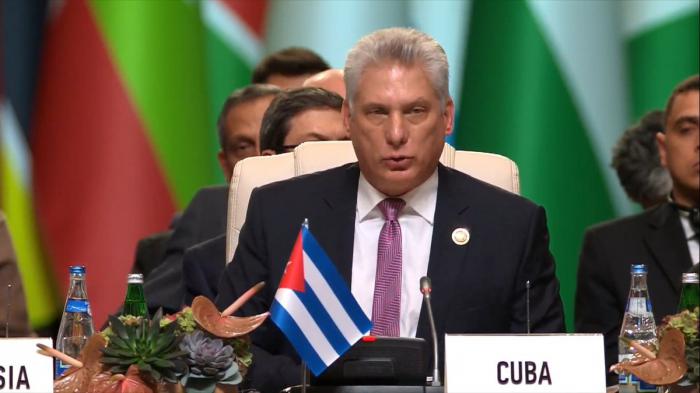
“Like the virus, the blockade asphyxiates and kills, it must stop,” Cuban Foreign Minister Bruno Rodríguez Parrilla had said.
“Washington in recent months has sought to destabilize and weaken the island’s economy as part of a policy designed to provoke a massive social implosion,” New York Times ran an editorial.
Similar protests were also seen during the 2019 US-backed military coup in Bolivia, in which the country’s first indigenous democratically-elected leader Evo Morales was overthrown by the military owing to a “faulty analysis” by the Organization of American States (OAS).
US-Cuba Tensions
The earliest exchanges between the US mainland and the archipelago off the coast of Florida were dependent on trade as Cuba was the hub of sugar and tobacco production.
After the Cuban drove out Spanish colonialists in 1878, the US filled the vacuum with its political dominance in the region, fueled by integrating the Cuban economy with that of North America.
In 1897, then-US President William McKinley offered to buy Cuba for $300 that led to a local rebellion and brief war between Spain and the US. After a brief military rule, Cuba formally gained independence in 1902.
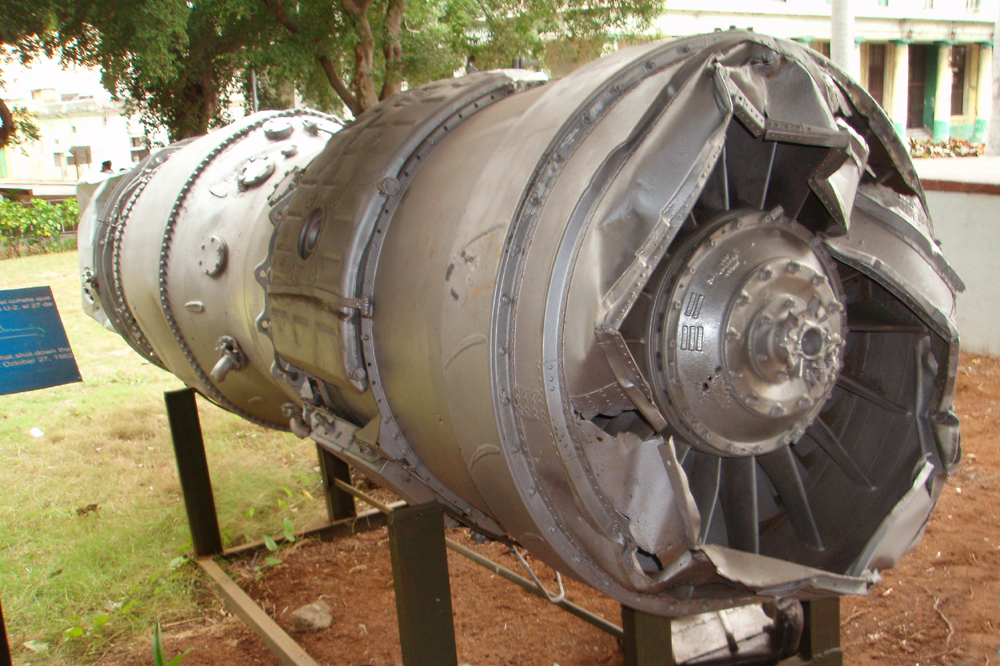
Until the onset of the Cold War, the US maintained a considerable influence over Cuban internal affairs and economic trade. Later, in a Cuban Revolution of 1959, a 9,000-strong guerilla army led by communist leader Fidel Castro and the revered comrade Che Guevara marched into Havana and topple the Sergeant Fulgencio Batista regime.
This became a turning point in the Cuba-US relations as Castro nationalized all American businesses on the island and extended a hand of friendship to the US’ Cold War rival- Soviet Union.
The repeated invasions by exiled Cuban-Americans, backed by the Central Intelligence Agency (CIA) to overthrow the Castro regime led to the infamous “Cuban Missile Crisis” in 1962 after Cuba requested the Soviet Union to place nuclear missiles on the island to deter a future invasion.

Eyeing the shift towards the Soviets and the presence of a communist regime just miles from the US East Coast, Washington imposed stringent economic sanctions on the country that predominantly depends on trade and tourism.
Russia, China Slam the US
China and Russia have joined countries such as Iran, Mexico, and Venezuela in calling for non-interference in the Cuban crisis and blamed US sanctions for the socio-economic crisis.
In April, Diaz-Canel took over from Raul Castro as the first secretary of the Communist Party of Cuba (PCC), the most powerful position in the one-party state.
Russian President Vladimir Putin while congratulating him called for building “strategic ties” between the two Cold War allies. Russian news agency TASS reported that Russia is keeping a close eye on the situation in Cuba and believes that outside interference is inadmissible.
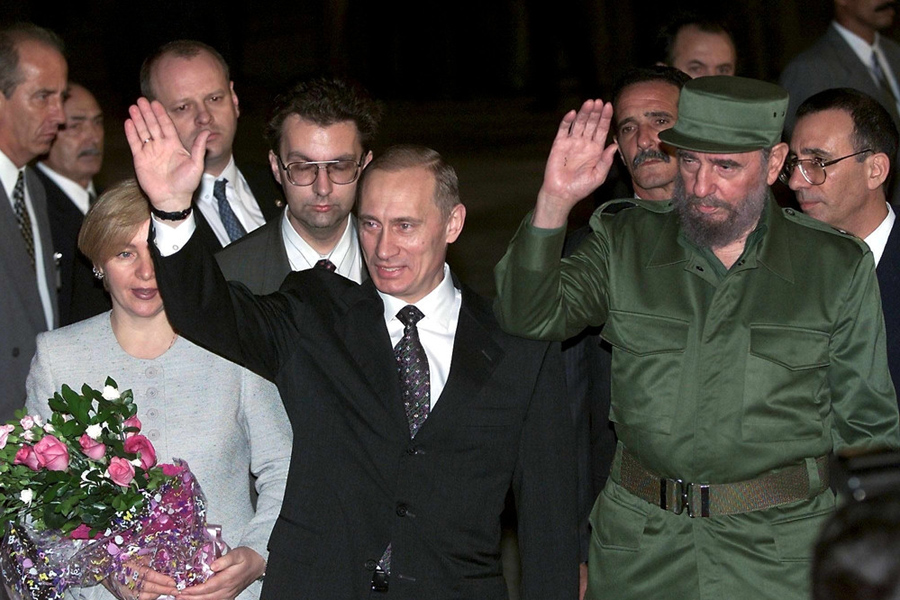
“We consider outside interference in the domestic affairs of a sovereign state and other destructive actions that would encourage the destabilization of the situation on the island unacceptable,” Russian Foreign Ministry Spokeswoman Maria Zakharova said.
“We are calling on Washington to take on an objective position finally, to get rid of the hypocrisy and hidden agendas in politics, and to let the Cubans, their government and people, deal with the situation themselves and determine their fate,” she added.
On July 14, amid the ongoing protests, Russian Deputy Foreign Minister Sergei Ryabkov met with Cuban ambassador Julio Garmendia Peña in Moscow, where the two sides stressed the “inadmissibility of foreign interference and other destructive actions that are fraught with the destabilization in Cuba,” according to Russian Foreign Ministry.
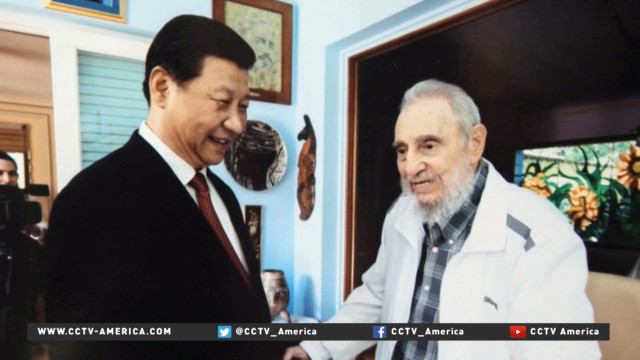
On the other hand, the Cuban Embassy in China on Tuesday denounced the US’ unconventional war scheme against Cuba which attempted to provoke the long-awaited “regime change,” state-run Global Times reported.
“Faced with this type of vandalism, written and promoted in detail in US subversion manuals, the response of the Cuban people will continue to be: Homeland or Death, We will win!” the embassy’s statement said.
China, which has repeatedly warned the US not to interfere in Taiwan affairs, now has found another reason to hit back at Washington.
Xi Jinping Wants To Achieve The Ultimate ‘Chinese Dream’; Experts Call It ‘Mission Impossible’
Earlier this week, Chinese Foreign Ministry spokesperson Zhao Lijian said Beijing firmly supports Cuba’s efforts in combating COVID-19 and maintaining social stability and the US should fully lift its blockade against Cuba.
The Chinese see anti-regime protests in Cuba as a direct challenge to socialism. Global Times published an op-ed supporting British political and international relations analyst Tom Fowdy’s tweet saying, “The US strangles socialist countries with sanctions and then propagates a narrative saying ‘socialism doesn’t work’ – and so many people fall for it”.


